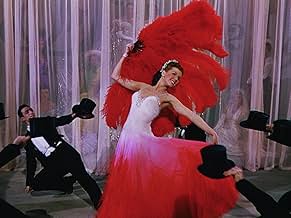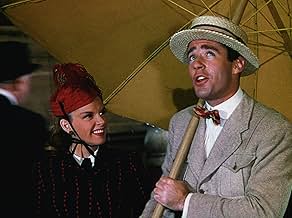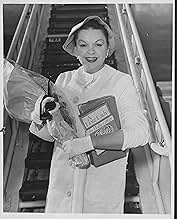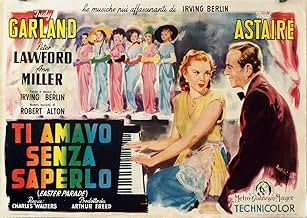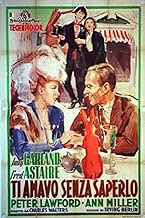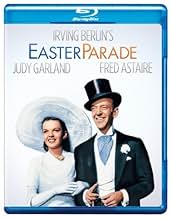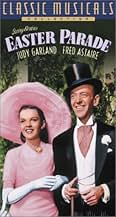IMDb-BEWERTUNG
7,3/10
11.720
IHRE BEWERTUNG
Füge eine Handlung in deiner Sprache hinzuA nightclub performer hires a naive chorus girl to become his new dance partner to make his former partner jealous and to prove he can make any partner a star.A nightclub performer hires a naive chorus girl to become his new dance partner to make his former partner jealous and to prove he can make any partner a star.A nightclub performer hires a naive chorus girl to become his new dance partner to make his former partner jealous and to prove he can make any partner a star.
- 1 Oscar gewonnen
- 5 wins total
John Albright
- Western Union Messenger
- (Nicht genannt)
Lola Albright
- Hat Model
- (Nicht genannt)
- …
Don Anderson
- Passerby on Street
- (Nicht genannt)
Shirley Ballard
- Showgirl
- (Nicht genannt)
Norman S. Barker
- Trombone player in bar
- (Nicht genannt)
Jimmy Bates
- Boy
- (Nicht genannt)
Virginia Bates
- Model
- (Nicht genannt)
Margaret Bert
- Florist
- (Nicht genannt)
Lulu Mae Bohrman
- Restaurant Patron
- (Nicht genannt)
Ralph Brooks
- Diner at Rooftop Show
- (Nicht genannt)
Empfohlene Bewertungen
For the only teaming of Fred Astaire and Judy Garland, Gene Kelly had to break an ankle playing touch football although he told the studio it was in rehearsal. So Fred Astaire who after another Irving Berlin musical extravaganza, Blue Skies at Paramount, got pulled out of retirement for this film. It was a happy accident for film fans.
Easter Parade by this time had become the national anthem for Easter and enjoys a grand seasonal popularity as Irving Berlin's White Christmas also. It was originally written for the musical revue As Thousands Cheer in 1933 and sung as a duet by Clifton Webb and Marilyn Miller. Bing Crosby reprised it in Holiday Inn in a very nice number driving a horsedrawn sleigh from church Easter services. But usually when it is presented visually, the clip of Judy Garland singing it in the finale is the one always shown.
By the way the melody originally was for a lyric entitled Smile and Show Your Dimple which bombed for Irving Berlin. Berlin was quoted as saying that popular songs are a perfect marriage between words and music and in this case the melody got divorced and married a second lyric successfully.
Easter Parade is a good mixture of old Irving Berlin material and new songs written for this film. Fred Astaire shines with one of the new ones in Stepping Out With My Baby which is a good followup to Putting On the Ritz which Astaire sang and danced to in Blue Skies. And Judy just shines in Better Luck Next Time.
The plot is a pretty simple one and for the MGM opulence that their musicals were known for their are very few actual speaking roles in this film. It's a romantic quadrangle with Fred Astaire being dumped by his erstwhile partner Ann Miller and then taking on Judy Garland in one of those 'I'll show her' moments of bravado. Peter Lawford's around to get whoever Astaire doesn't.
The acting honors in Easter Parade go to Judy. For all that talent Judy Garland was a most insecure person in life and she drew from that in bringing Hannah Brown to the screen.
Ann Miller's big number is Shaking the Blues Away which Ruth Etting introduced in 1927. Doris Day in fact does it in Love Me or Leave Me. Still Ann makes it more of a dance number than Doris did which is what Irving Berlin originally intended it to be.
The thing about Easter Parade and so many other films like it is that all that talent was contracted to that studio. You can't make a film like Easter Parade today because you'd have to pay full market price for the talent, even as Irving Berlin's numbers slip year after year into public domain.
The Easter parade with women dressed in their finest most tasteful frock is still a New York tradition on Easter Sunday. So is this film.
Easter Parade by this time had become the national anthem for Easter and enjoys a grand seasonal popularity as Irving Berlin's White Christmas also. It was originally written for the musical revue As Thousands Cheer in 1933 and sung as a duet by Clifton Webb and Marilyn Miller. Bing Crosby reprised it in Holiday Inn in a very nice number driving a horsedrawn sleigh from church Easter services. But usually when it is presented visually, the clip of Judy Garland singing it in the finale is the one always shown.
By the way the melody originally was for a lyric entitled Smile and Show Your Dimple which bombed for Irving Berlin. Berlin was quoted as saying that popular songs are a perfect marriage between words and music and in this case the melody got divorced and married a second lyric successfully.
Easter Parade is a good mixture of old Irving Berlin material and new songs written for this film. Fred Astaire shines with one of the new ones in Stepping Out With My Baby which is a good followup to Putting On the Ritz which Astaire sang and danced to in Blue Skies. And Judy just shines in Better Luck Next Time.
The plot is a pretty simple one and for the MGM opulence that their musicals were known for their are very few actual speaking roles in this film. It's a romantic quadrangle with Fred Astaire being dumped by his erstwhile partner Ann Miller and then taking on Judy Garland in one of those 'I'll show her' moments of bravado. Peter Lawford's around to get whoever Astaire doesn't.
The acting honors in Easter Parade go to Judy. For all that talent Judy Garland was a most insecure person in life and she drew from that in bringing Hannah Brown to the screen.
Ann Miller's big number is Shaking the Blues Away which Ruth Etting introduced in 1927. Doris Day in fact does it in Love Me or Leave Me. Still Ann makes it more of a dance number than Doris did which is what Irving Berlin originally intended it to be.
The thing about Easter Parade and so many other films like it is that all that talent was contracted to that studio. You can't make a film like Easter Parade today because you'd have to pay full market price for the talent, even as Irving Berlin's numbers slip year after year into public domain.
The Easter parade with women dressed in their finest most tasteful frock is still a New York tradition on Easter Sunday. So is this film.
I don't know why I haven't checked this out on DVD yet. I imagine it looks spectacular, because even the VHS looked super. I'm talking about the Technicolor. Man, those Technicolor films in the '40s were beautiful, as this certainly is.
For entertainment, you get Fred Astaire dancing, Judy Garland singing, Ann Miller dancing, and Peter Lawford singing. I didn't think Lawford could sing, but he's not bad here. The other talent must have elevated his.
Astaire consistently amazed audiences with his innovative dance routines and smooth style. He does a number here in a toy store that is really something! Miller also gives us a good tap number and Garland's songs are all winners.
This movie is more vehicle for those above-mentioned stars than it is in telling some profound the story. The story is not much, but who cares? It's the dancing, singing, the incredible costumes, overall color, nice people and just plain feel-good musical atmosphere that makes this a popular film, even to this day.
For entertainment, you get Fred Astaire dancing, Judy Garland singing, Ann Miller dancing, and Peter Lawford singing. I didn't think Lawford could sing, but he's not bad here. The other talent must have elevated his.
Astaire consistently amazed audiences with his innovative dance routines and smooth style. He does a number here in a toy store that is really something! Miller also gives us a good tap number and Garland's songs are all winners.
This movie is more vehicle for those above-mentioned stars than it is in telling some profound the story. The story is not much, but who cares? It's the dancing, singing, the incredible costumes, overall color, nice people and just plain feel-good musical atmosphere that makes this a popular film, even to this day.
There's an incredible backstory behind Easter Parade. Fred Astaire had announced his retirement from movies, and Gene Kelly was attached to the new Judy Garland musical set at Eastertime. Then, Gene experienced every dancer's nightmare and broke his leg. He called Fred up and asked if he'd take his place. And now we have Easter Parade!
Now that you know Gene Kelly was supposed to play the lead, it's understandable that he was supposed to sing the seductive "It Only Happens When I Dance with You" to Ann Miller. How would Fred Astaire handle it? He's not usually marketed as having much sex appeal. Well, move over Gene Kelly; Fred's just fine. In fact, although there are plenty of great numbers in Easter Parade, that one's my favorite because of the different tone Fred takes with himself.
There are quite a few famous songs from this movie, most notably the performance Fred and Judy give dressed like bums: "A Couple of Swells". Peter Lawford plays the other man in both love triangles-although who would ever pick him over Fred Astaire?-and he gets to sing the cute "A Fella with an Umbrella" when he meets Judy Garland. "Steppin' Out with My Baby" is another performance on the stage-Fred's character is a performer looking for a new partner-that utilizes groundbreaking camerawork that's still fantastic to watch. Fred dances in slow motion while the chorus girls behind him move in regular time, and the layered look is jaw-droppingly innovative for 1948.
I've praised several of Irving Berlin's songs from the movie, but they're not all fantastic. "I was born in Michigan, and I wish and wish again. . ." is a lyric from one of the silly songs Judy has to sing. So, while there will be a few scenes that will make you cringe and leave the room for more popcorn, most of the movie is pretty fun to watch. I own a copy, and we watch it every few years on Easter when we want a break from our usual Ben-Hur. I always like Fred Astaire's movies, so it has to be really stinky for me to not recommend it. I mean, who else but Fred can walk into a toy store and turn the toys into a dance number? Watch his dance "Drum Crazy" in Easter Parade and ask him through the television why he bothered trying to retire.
Now that you know Gene Kelly was supposed to play the lead, it's understandable that he was supposed to sing the seductive "It Only Happens When I Dance with You" to Ann Miller. How would Fred Astaire handle it? He's not usually marketed as having much sex appeal. Well, move over Gene Kelly; Fred's just fine. In fact, although there are plenty of great numbers in Easter Parade, that one's my favorite because of the different tone Fred takes with himself.
There are quite a few famous songs from this movie, most notably the performance Fred and Judy give dressed like bums: "A Couple of Swells". Peter Lawford plays the other man in both love triangles-although who would ever pick him over Fred Astaire?-and he gets to sing the cute "A Fella with an Umbrella" when he meets Judy Garland. "Steppin' Out with My Baby" is another performance on the stage-Fred's character is a performer looking for a new partner-that utilizes groundbreaking camerawork that's still fantastic to watch. Fred dances in slow motion while the chorus girls behind him move in regular time, and the layered look is jaw-droppingly innovative for 1948.
I've praised several of Irving Berlin's songs from the movie, but they're not all fantastic. "I was born in Michigan, and I wish and wish again. . ." is a lyric from one of the silly songs Judy has to sing. So, while there will be a few scenes that will make you cringe and leave the room for more popcorn, most of the movie is pretty fun to watch. I own a copy, and we watch it every few years on Easter when we want a break from our usual Ben-Hur. I always like Fred Astaire's movies, so it has to be really stinky for me to not recommend it. I mean, who else but Fred can walk into a toy store and turn the toys into a dance number? Watch his dance "Drum Crazy" in Easter Parade and ask him through the television why he bothered trying to retire.
Don't you just love those old 40's musicals? Easter Parade is certainly one of the best, with Fred Astaire doing his amazing flashy but precise dancing, Judy Garland using her legendary voice to sing right from her heart into yours, and Ann Miller doing her own unique style of dancing and tapping while belting out great songs. And of course, everybody in the film uses any excuse to sing yet another song, usually dancing to it as well.
One of the special sequences has Fred Astaire dancing in slow motion while the rest of the cast dance at normal speed behind him! Sure, we can do that these days with computers, but remember this film was made in 1948!!
Of course there's the usual plot - Boy meets girl, they fall in love, have a misunderstanding, but get together again just in time for the big finishing number. That used to really get the audiences in, in those days, and they repeated that theme in every musical that ever was.
Any weak spots? Several of the film's routines seem a little amateurish by today's standards. For example, the waiter tossing his invisible salad just to do a bit of clowning seems a little contrived. Also, the film is supposedly set in 1912, so all the 1948 fashions and hairstyles are completely anachronistic - but what does that matter, after all, it's just an enjoyable romp.
I've given this film eight out of ten, but if I could just vote on Judy Garland's singing and Fred Astaire's dancing, I'd certainly give them ten out of ten. This is definitely a "must-see" film, just for those two incredible talents!
One of the special sequences has Fred Astaire dancing in slow motion while the rest of the cast dance at normal speed behind him! Sure, we can do that these days with computers, but remember this film was made in 1948!!
Of course there's the usual plot - Boy meets girl, they fall in love, have a misunderstanding, but get together again just in time for the big finishing number. That used to really get the audiences in, in those days, and they repeated that theme in every musical that ever was.
Any weak spots? Several of the film's routines seem a little amateurish by today's standards. For example, the waiter tossing his invisible salad just to do a bit of clowning seems a little contrived. Also, the film is supposedly set in 1912, so all the 1948 fashions and hairstyles are completely anachronistic - but what does that matter, after all, it's just an enjoyable romp.
I've given this film eight out of ten, but if I could just vote on Judy Garland's singing and Fred Astaire's dancing, I'd certainly give them ten out of ten. This is definitely a "must-see" film, just for those two incredible talents!
Originally intended as a re-teaming of Judy Garland and Gene Kelly, EASTER PARADE ran into trouble when Garland's doctors advised against her working under the direction of her husband, director Vincent Minnelli--and no sooner did director Charles Walters take the helm than Gene Kelly broke his leg. Out of such confusion are movie musical miracles born: although a bit old to act as Garland's leading man, Fred Astaire was coaxed out of retirement. He and Garland had tremendous chemistry, EASTER PARADE was a box office smash, and Astaire unexpectedly found himself reborn as an MGM star.
Set in 1900s New York, the film's story line is flimsy but enjoyable. After long-time dance partner Ann Miller abandons the act, Astaire hires chorus girl Garland and attempts to recast her in his former partner's mold--a situation which offers Astaire and Garland considerable comedy and gives Astaire the chance to parody several of his own famous dance of the 1930s. Garland eventually convinces Astaire that she needs to be herself, and once the act is revamped they become a hot ticket--and, once their several romantic complications are resolved, romantic partners as well.
Astaire is every bit as charming here as he was in his Ginger Roger days, and his choreography retains his signature sharpness, wit, and elegance. Although Garland isn't really a dancer, she holds her own with Astaire and she tears strips off a brilliant score of Irving Berlin favorites. Both are well supported by Anne Miller, who gives a brilliant turn with 'Shakin' the Blues Away,' and Peter Lawford, who is quite charming as one of Garland's admirers. Although this really isn't as inspired as the truly great MGM musicals of the late 1940s, director Walters keeps it going at a smart pace, and the star power, clever script, memorable score, and those legendary MGM production values elevate it well above the pack. Musical fans will be in for a treat! Recommended.
Gary F. Taylor, aka GFT, Amazon Reviewer
Set in 1900s New York, the film's story line is flimsy but enjoyable. After long-time dance partner Ann Miller abandons the act, Astaire hires chorus girl Garland and attempts to recast her in his former partner's mold--a situation which offers Astaire and Garland considerable comedy and gives Astaire the chance to parody several of his own famous dance of the 1930s. Garland eventually convinces Astaire that she needs to be herself, and once the act is revamped they become a hot ticket--and, once their several romantic complications are resolved, romantic partners as well.
Astaire is every bit as charming here as he was in his Ginger Roger days, and his choreography retains his signature sharpness, wit, and elegance. Although Garland isn't really a dancer, she holds her own with Astaire and she tears strips off a brilliant score of Irving Berlin favorites. Both are well supported by Anne Miller, who gives a brilliant turn with 'Shakin' the Blues Away,' and Peter Lawford, who is quite charming as one of Garland's admirers. Although this really isn't as inspired as the truly great MGM musicals of the late 1940s, director Walters keeps it going at a smart pace, and the star power, clever script, memorable score, and those legendary MGM production values elevate it well above the pack. Musical fans will be in for a treat! Recommended.
Gary F. Taylor, aka GFT, Amazon Reviewer
Wusstest du schon
- WissenswertesGene Kelly was originally scheduled to play Don, but he broke his ankle playing volleyball in his backyard. It was his suggestion that he be replaced by Fred Astaire. Cyd Charisse was up for the role of Nadine, but a torn ligament in either one or both of her knees forced her to drop out. She was replaced by Ann Miller.
- PatzerA Police officer writes Jonathan (Peter Lawford) a ticket for parking beside a fire hydrant. As he hands over the ticket, he bumps the hydrant which wobbles.
- Alternative VersionenThere is an Italian edition of this film on DVD, re-edited in double version (1.33:1 and 1.78:1) with the contribution of film historian Riccardo Cusin. This version is also available for streaming on some platforms.
- VerbindungenEdited into Geschichte(n) des Kinos: Seul le cinéma (1994)
- SoundtracksHappy Easter
(uncredited)
Written by Irving Berlin
Performed by Fred Astaire
Performed also by Fred Astaire and Judy Garland
Top-Auswahl
Melde dich zum Bewerten an und greife auf die Watchlist für personalisierte Empfehlungen zu.
Details
- Erscheinungsdatum
- Herkunftsland
- Sprachen
- Auch bekannt als
- Desfile de Pascua
- Drehorte
- Produktionsfirma
- Weitere beteiligte Unternehmen bei IMDbPro anzeigen
Box Office
- Budget
- 2.503.654 $ (geschätzt)
- Weltweiter Bruttoertrag
- 1.605 $
- Laufzeit
- 1 Std. 43 Min.(103 min)
- Seitenverhältnis
- 1.37 : 1
Zu dieser Seite beitragen
Bearbeitung vorschlagen oder fehlenden Inhalt hinzufügen







